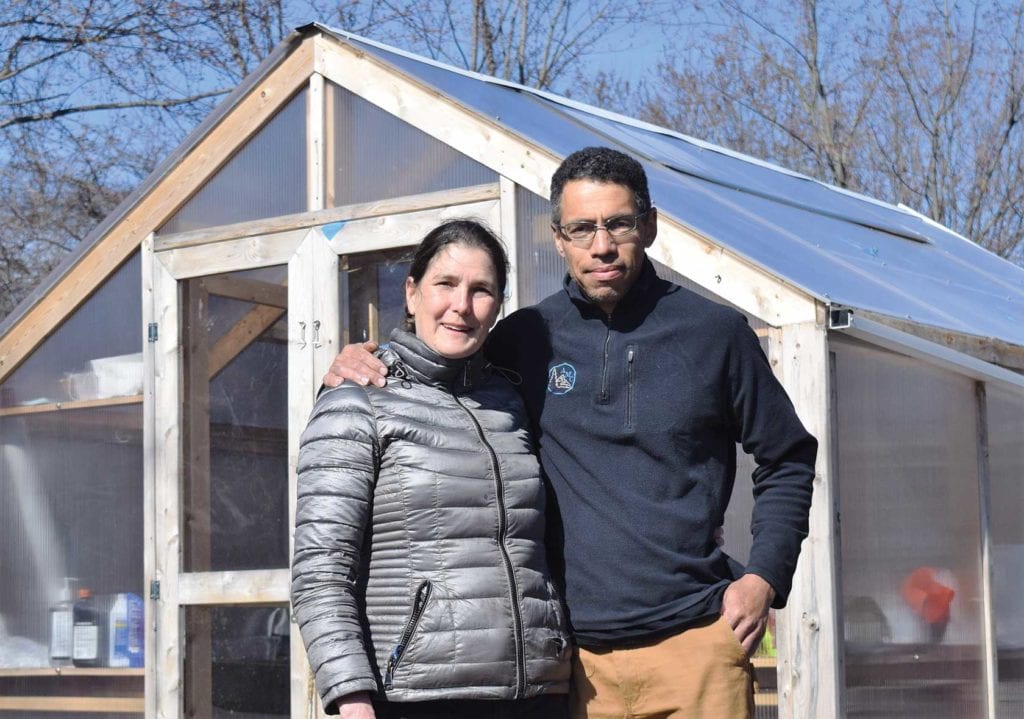
After an arduous four-year process since approaching the City of Boston with their intention to start an urban farm specializing in microgreens, horticulturists Tim Smith and Lisa Evans are finally making it happen.
As the founders of We Grow Microgreens, LLC, Smith and Evans are currently building their own 35,000-square-foot urban farm at 21 Norton St. in Hyde Park. They anticipate completing the project by June of this year.
Smith and Evans have been cultivating young vegetable greens, which grow up to three inches, from their home in Roslindale and have carried out their small-scale commercial enterprise from there.
“Microgreens can be grown anywhere in any small and controlled environment,” says Smith, a former Boston Public Schools teacher and long-time gardener. “But we’ll be able to grow 10 times as much product and become a more efficient company.”
Microgreens are edible seedlings of vegetables and herbs grown up to the cotyledons, or first true leaf stages. Compared to mature plants, microgreens contain five times more nutrient density and provide visual appeal for chefs.
“There is a demand for fresh local products like this in Boston,” says Smith.
In addition to these tiny edible greens, We Grow Microgreens also produces edible flowers and subtropical plants. They sell their products in various farmers markets all over Massachusetts and in the city, and have a rotating client base of local restaurants, such as Harvest in Cambridge.
Evans and Smith run their micro-plant enterprise with the help of six youth workers from nearby communities. Smith says they will consider hiring more workers at the larger space but plan to “still remain a small-scale operation.”
When completed, the new farm will feature a 4,600-square-foot greenhouse in the southern, street-facing part of the lot, with small hoop houses (low-cost simplified greenhouses) and raised beds toward the back of the lot.
In the two-and-a-half years since the pair identified the city-owned lot at 21 Norton St., which used to be an abandoned dumping ground of trash and debris, Evans and Smith had to go through several community meetings to convince neighbors of the value of their project, as well as seek approval from 10 different city and state agencies.
“It was a slow, methodical process, but we felt supported the whole time,” says Evans, who mentioned specifically the support of City Councilor Tim McCarthy, who lives up the street from the upcoming farm.
Smith and Evans have wasted no time breaking ground on the lot since receiving a permit just a couple weeks ago. Additional investment for scaling up their business has come in the form of various grants.
Funds awarded from the city’s Community Preservation Act will help create a walking path for visitors, which will loop around the We Grow Microgreens farm as “a little respite from the city,” says Smith.
Two grants awarded by the Massachusetts Department of Agriculture will help fund the farm’s greenhouse and make it more energy-efficient with solar panels, a shade curtain and an insulated foundation.
Managing their own farm as opposed to the densely packed operation in their Roslindale backyard will allow Evans and Smith to grow the business and diversify their offerings with more edible flowers, baby greens and herbs.
The two are excited about the local buy-in for urban farming, which is part of a global movement with innovative strategies and tools, such as shipping containers and vertical gardens, popping up in every city.
“Many communities around the world are really thinking about food insecurity,” says Smith. “There is significant amount of investment around the globe for communities to be more self-sufficient.”








